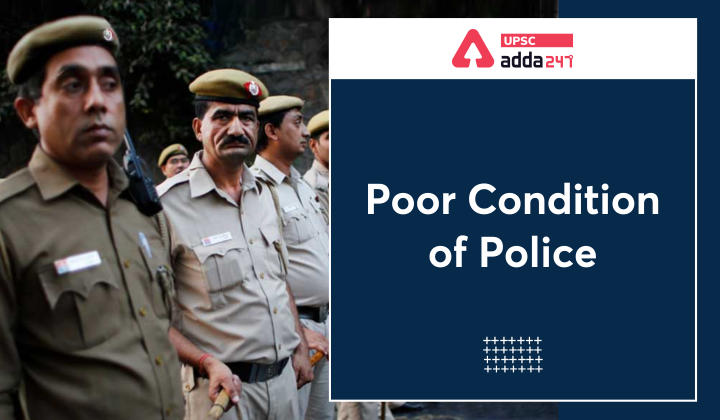Context:
Every year all the police forces of the State and Centre observe October 21 as Police Commemoration Day. This year, tributes were paid to 377 personnel who lost their lives in the line of duty between September 1, 2020, and August 31, 2021.
Background:
October 21 is observed as Police Commemoration Day as it was on this day in 1959 that a pitched battle was fought against the Chinese in Ladakh close to the border. The Chinese opened fire killing 10 CRPF personnel. They took seven as prisoners, while three escaped. The incident went down in the history of the forces as an example of unflinching loyalty to the nation, dedication to duty and daring of the highest order.
The Annual Conference of Inspectors General of Police of States and Union Territories held in January 1960 decided that 21st October will be observed as Commemoration Day in all Police Lines throughout India to mark the memory of these gallant personnel.
Factors Describing Condition of Police in the Country
Poor Work Culture:
- Police personnel are under stress due to workload, poor work-life balance, and deficiency of resources.
- An average police officer works for 14 hours a day, six hours more than what the Model Police Act recommends.
- Other than poor work-life balance, the police personnel also have to work with limited resources at their disposal.
- Some police stations lack basic facilities such as drinking water, clean toilets, transport, staff and funds for routine purchases.
Risk Factor:
- Every year highest casualties are seen in the CRPF as the CRPF is deployed in the highly disturbed areas of Jammu and Kashmir, the Northeast and the Left-Wing Extremist-affected States.
- The Indo-Tibetan Border Police (ITBP), which guards the border from Ladakh to Arunachal Pradesh at forbidding heights, the Border Security Force, J&K Police, Chattisgarh State Police force which is combating the Maoist menace are also highly vulnerable police forces in terms of casualties.
- Apart from these national issues, every day, every hour almost all state police forces are facing some kind of risk or threat at the local level while performing their duties.
Where is the Morale?
- Despite the onerous nature of their duties, the police are a neglected lot. They get paid low salaries, have a poor quality of life and are often deprived of basic facilities. Yet they risk their lives to protect citizens.
- The morale of the paramilitary personnel is not of the desired level.
- Those who cleared recruitment exams in 2003 but joined the force in 2004 or later are not eligible for pension under the old norms. The canteen and medical facilities are dismal. Items sold through the Central Police Canteens are not exempted from GST.
- There are notable variations in the Ex-Gratia amounts given to the next of kin of the police who are killed. The Centre and the States need to bring about uniformity in the amount paid.
Various attempts for Police Reforms:
- National Police Commission (1978-82);
- The Padmanabhaiah Committee on the restructuring of Police (2000); and
- The Malimath Committee on reforms in the Criminal Justice System (2002-03).
- Ribero Committee 1998
- Directions of the Supreme Court of India (2000-01)
- Malimath Committee on Reforms of Criminal Justice System(2001-03).
- The Second Administrative Reforms Commission.
What should be done to boost Morale?
- Care should be taken to ensure that the next of kin are not deprived of a decent living. Payments from the public exchequer need to be made judiciously.
- It is high time the government takes note of the grievances of the police and paramilitary personnel and does not let their sacrifices go in vain.
- Political interference in police postings continues despite the landmark Prakash Singh judgment nearly a decade-and-a-half ago and that should be stopped with utmost priority.
- 18 States have passed or amended their Police Acts following the Supreme Court order in the Prakash Singh case in 2006, but the ground reality is not changed. So, only a citizen-centric national action plan will bring some change.
Conclusion:
Policing is becoming a thankless job and the police are increasingly finding it difficult to maintain a work-life balance. Over the years, it is becoming more and more difficult to be a law enforcer. In this situation, an integrated and serious discussion is required to bring a change in police personnel work culture across the country.



 TSPSC Group 1 Question Paper 2024, Downl...
TSPSC Group 1 Question Paper 2024, Downl...
 TSPSC Group 1 Answer key 2024 Out, Downl...
TSPSC Group 1 Answer key 2024 Out, Downl...
 UPSC Prelims 2024 Question Paper, Downlo...
UPSC Prelims 2024 Question Paper, Downlo...
